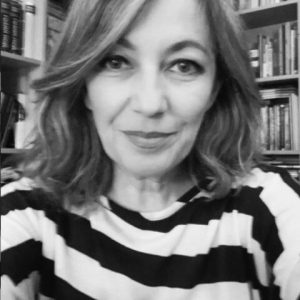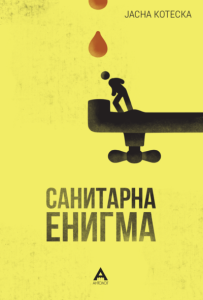 JASNA KOTESKA
JASNA KOTESKA
Macedonia
Jasna Koteska (1970, Skopje) is a Macedonian writer, philosopher and full professor of humanities at the "St. Cyril and Methodius" University in Skopje. She is the author of eleven books on Sigmund Freud, Soren Kierkegaard, communism, sanitation, published in Washington, DC, Toronto, Belgrade, Ljubljana, Sofia and Skopje, including Kierkegaard on Consumerism (2016, Toronto and Ljubljana), Freud's Reader, Early Psychoanalysis 1893 -1899 (2013, Skopje) and Communist Intima (2008, Skopje; 2014, Washington). The book Communist Intimacy (2014, Washington) was selected at the so-called Finnegan's List of 30 Books of 2015 European Writers' Association (Berlin, Paris). Kierkegaard's book on consumerism. Aesthetic, ethical and religious reading (2016, Toronto and Ljubljana) in 2017 received the "Goce Delčev" state award for outstanding achievements in the field of science of interest to the Republic of Macedonia. Koteska has published over 200 academic studies in the country and abroad and on a wide range of topics, including: intimacy, sanitation, trauma, repetition, gestures, gender studies, as well as studies on 19th-century philosophy and literature, some of them translated into 12 languages. Koteska is the author of the first history of Macedonian women's writing from 1945-2000, the book "Macedonian Women's Writing. Theory, History and Description" (Skopje, 2002). She works as the editor-in-chief of the Collection Aut edition at Trinity College in Toronto and at the Central European Research Center Soren Kierkegaard (CERI-SK) in Ljubljana. She periodically writes columns and blog posts about current social issues in the country and abroad. Koteska is a member of the Philosophical Society of Macedonia, the Independent Writers of Macedonia, as well as several international organizations and boards. She is the coordinator of the 2021-2023 education study group within the Nordic Summer Universities. Together with Dr. Ilina Jakimovska, she is the co-editor of the book The Ethnologist as a Writer: The Writer as an Ethnologist (Skopje, 2020), and she is currently working on two literary works, Freud's Reader 2. 1900-1901 and Kafka, the Humorist.
 Sanitary Enigma
Sanitary Enigma
Is Sanitation Power; does the power have a sanitary source? What is the economy that manages the territory of the pure? What is the name of the doctor who heals the wound of an unclean conscience at the same time as it pollutes it?
What is the connection between soap and fascism? Why is every colonial empire first established as a hygiene empire? What solution to the treatment of "pure" blood did Disney offer modern television war moguls? When and why was litter criminalized? Why is the modern city born out of a dispute with animal, life-giving impulses? Why does joy imply familiarity and filth?
How are sexuality and sanitation interrelated? Why is there no desire that is culturally appropriate? Which dream did Freud refuse to interpret and why? Is there an empty subject and what is the content of its substance?
These are some of the questions that the "Sanitary Enigma" study opens up for reflection.
